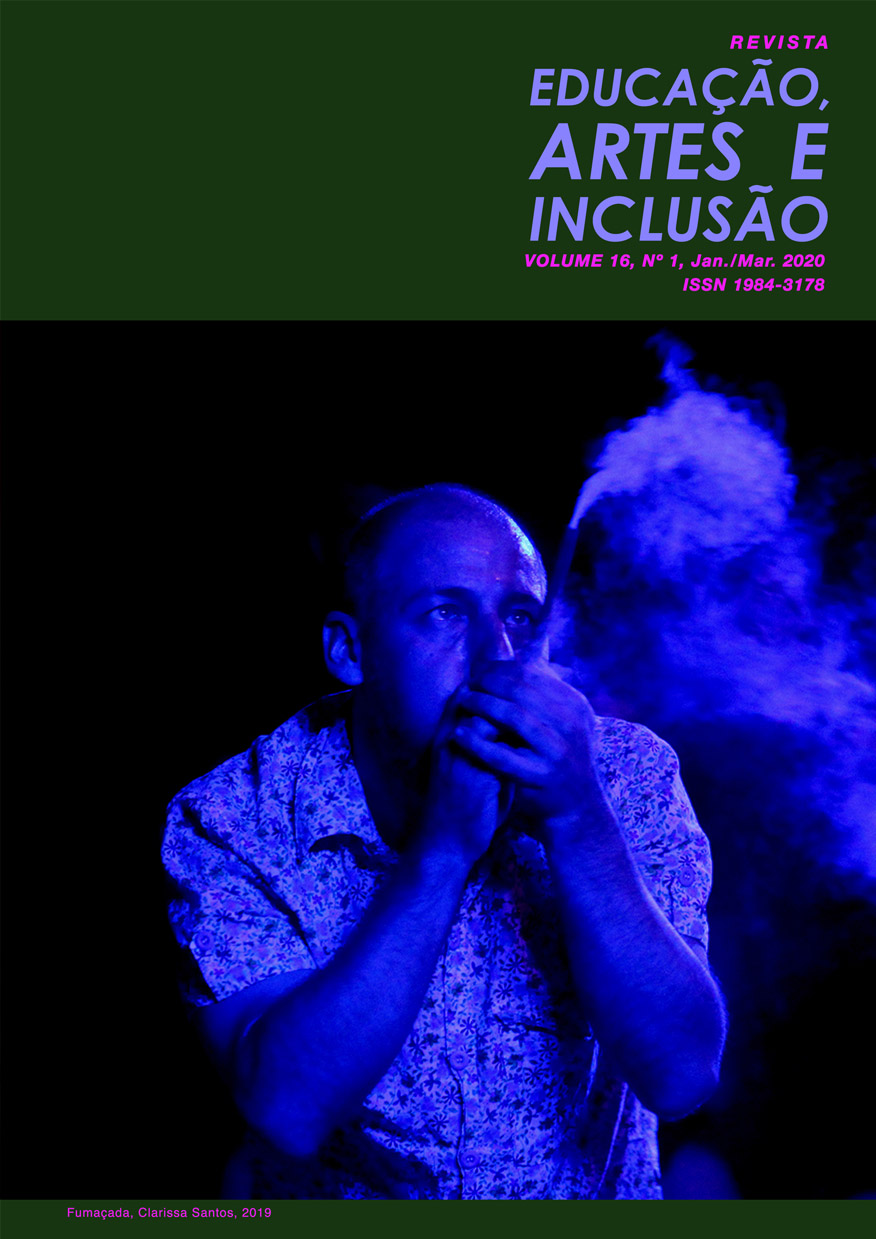Narrativas de investigação e formação em Educação Artística no Ensino Superior: escrita dialógica em devir
DOI:
https://doi.org/10.5965/1984317816012020008Palavras-chave:
Narrativas de formação, Educação Artística, Ensino Superior, Escrita Dialógica,Resumo
Neste artigo propomos produzir e analisar narrativas sobre experiências de escrita no ensino superior universitário, explorando e ampliando práticas de escrita narrativa dialógica. Realizada a oito mãos, a narrativa que se constrói e, subsequentemente, se procura analisar é submetida a uma reflexão contínua, polivalente, que exprime uma procura metodológica de exploração e ampliação das possibilidades da escrita formativa em educação artística. Por escrita dialógica, pretende-se frisar as potencialidades da construção de um texto que seja poliédrica, não hierarquizada, mas suficientemente fragmentada e entrecruzada para poder ser o reflexo de cada uma das autoras. Assume-se a narrativa como forma de pesquisa enquanto se escreve, uma escrita em devir e em diálogo pela qual se vai transformando a compreensão dos processos em análise e recriando os próprios processos de análise. Para além de uma reflexão teórica sobre a escrita e sobre as narrativas como processos de formação e investigação e de uma breve contextualização e apresentação metodológica, o artigo organiza as narrativas por temas, numa sucessão dialógica de textos de autoria individual, onde se mesclam discursos em prosa e poesia, comentados dialeticamente em textos conjuntos e posteriormente interpretadas do ponto de vista da formação e da investigação.
Downloads
Referências
ALMEIDA, Marta Mateus de. Desenvolvimento profissional dos docentes do ensino superior. Orientadora: ngela Rodrigues. 2012. 438 f. Tese (Doutoramento em Educação - Formação de Professores) – Instituto de Educação da Universidade de Lisboa, Lisboa, Portugal, 2013.
ATKINSON, Dennis. The adventure of pedagogy, learning and the not-known. Subjectivity, v. 8, n. 1, p. 43- 56. 2015.
BALDACCHINO, John. Art ± education: The paradox of the ventriloquist’s soliloquy. Sisyphus: Journal of education, Lisboa, v. 3, n. 1, p. 62-79. 2015.
BENJAMIN, Walter. Sobre a arte, técnica, linguagem e política. Lisboa: Relógio d’Água, 1992.
BOLÍVAR, Antonio; DOMINGO, Jesús. La investigación biográfica y narrativa en Iberoamérica: Campos de desarrollo y estado actual. Forum: Qualitative Social Research, v. 7, n. 4, art. 12, 2006. Disponível em: http://jbposgrado.org/icuali/La%20investigacion%20biografica%20y%20narrativa%20en%20iberoamerica%20%20%20.pdf Acesso em: 5 dez. 2019.
CAETANO, Ana Paula.; PAZ, Ana Luísa.; NARDUELA, Absalão.; PARDAL, Adriana.; ROCHA, Ana.; RÉ; Sofia.; CORREIA, Cinayana.; MARQUES, Clara; SILVA, Helena.; ANDRADE, Joana.; CARVALHO, Manuela; MEIRELES, Teresa. As Artes no Ensino Superior – ‘Pedagogias do evento’ no Doutoramento em Educação Artística. In: GONÇALVES, Susana; COSTA, José Joaquim (Eds.), Diversidade no Ensino Superior. Coimbra: CINEP-IPCe, 2019. p. 239-260.
DELEUZE, Gilles. Sobre o Teatro: Um manifesto de menos e o esgotado. Rio de Janeiro: Jorge Zahar, 2010.
DELEUZE, Gilles.Spinoza et le problème de l’expression. Paris: Minuit, 1968.
FOUCAULT, Michel. As palavras e as coisas. Lisboa: Edições 70, 1998.
FOUCAULT, Michel. O corpo utópico, as heterotopias. São Paulo: n1 Edições, 2013.
GAZTAMBIDE-FERNÁNDEZ, Ruben. Why the arts don't do anything: Toward a new vision for cultural production in education. Harvard Educational Review, v. 83, n. 1, p. 211-237. 2013.
HERNANDEZ, Fernando H. La investigación basada en las artes. Propuestas para repensar la investigación en Educación. Education Siglo XXI, n. 26, p. 85-118. 2008.
IRWIN, Rita L. Becoming A/r/tography. Studies in Art Education, v. 54, n. 3, p. 198-215. 2013.
JOSSO, Marie-Christine. A transformação de si a partir da narração de histórias de vida. Educação, Porto Alegre/RS, v. 63, n. 3, p. 413-438, set/dez. 2007.
POPKEWITZ, Thomas. Historicizing how theory acts as ‘the retrieval’ apparatus in methods. In: FITZGERALD, T. (Ed.), Handbook of Historical Studies in Education: Debates, Tensions and Directions (22 pp.). Singapura: Springer, 2020, no prelo.
POWELL, Kimberly. Prelude. Moving from still life: Emerging conceptions of the body in arts education. In: BRESLER, L. (Ed.). International Handbook of Research in Arts Education. Dordrecht: Springer, 2007. p. 1083-1086.
RICOEUR, Paul. Temps et récit. 3. Le temp raconté. Paris: Éditions du Seuil, 1985.
RICOEUR, Paul. O discurso da ação. Lisboa: Edições 70, 2014.
ROLFE, Linda. Using learner journals in teacher education in the arts. In: BURNARD Pamela; HENESSY, Sara (Eds.), Reflective practices in Arts Education. Dordrecht: Springer, 2009. p. 95-106.
SOUZA, Elizeu Clementino. Diálogos cruzados sobre pesquisa (auto)biográfica: análise compreensiva-interpretativa e política de sentido. Educação, Santa Maria, v. 39, n. 11, p. 39-50. 2014
Downloads
Publicado
Como Citar
Edição
Seção
Licença
Copyright (c) 2020 Ana Paula Caetano, Ana Luísa Paz, Ana Rocha, Clara Marques

Este trabalho está licenciado sob uma licença Creative Commons Attribution-NonCommercial 4.0 International License.
A Revista Educação Artes e Inclusão é um periódico que segue a Política de Acesso Livre. Os artigos publicados pela revista são de uso gratuito, destinados a aplicações educacionais e não comerciais. Os artigos cujos autores são identificados representam a expressão do ponto de vista de seus autores e não a posição oficial da Revista Educação, Artes e Inclusão [REAI].
Autores que publicam nesta revista concordam com os seguintes termos:
(a) Autores mantém os direitos autorais e concedem à revista o direito de primeira publicação, com o trabalho simultaneamente licenciado sob a Licença Creative Commons Attribution que permite o compartilhamento do trabalho com reconhecimento da autoria e publicação inicial nesta revista.
(b) Autores têm autorização para assumir contratos adicionais separadamente, para distribuição não-exclusiva da versão do trabalho publicada nesta revista (ex.: publicar em repositório institucional ou como capítulo de livro), com reconhecimento de autoria e publicação inicial nesta revista.
(c) Esta revista proporciona acesso público a todo o seu conteúdo, uma vez que isso permite uma maior visibilidade e alcance dos artigos e resenhas publicados. Para maiores informações sobre esta abordagem, visite Public Knowledge Project.
Esta revista está licenciada com uma Licença Creative Commons Atribuição-NãoComercial 4.0 Internacional. Esta licença permite que outros remixem, adaptem e criem a partir do seu trabalho para fins não comerciais, e embora os novos trabalhos tenham de lhe atribuir o devido crédito e não possam ser usados para fins comerciais, os usuários não têm de licenciar esses trabalhos derivados sob os mesmos termos.





